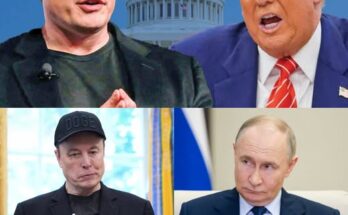
Elon Musk—billionaire CEO, tech visionary, and often the subject of tabloid headlines—has found himself embroiled in yet another personal controversy. This time, the spotlight shines on his alleged “13th child” and a bitter custody dispute that pits the world’s richest man against conservative influencer Ashley St. Clair. In a dramatic twist, St. Clair claims that, despite publicly announcing the birth of her five‐month‑old baby and filing legal petitions, Musk has met the child only three times. With accusations of neglect, broken agreements, and messy text exchanges flooding the news, the custody battle has become yet another chapter in Musk’s tumultuous personal life.
The timeline of events paints a dramatic picture of a rapidly escalating custody dispute. According to court filings and media reports, St. Clair alleges that she and Musk began a brief romantic relationship in May 2023, which culminated in the conception of the child in January 2024. Despite her repeated attempts to negotiate a private resolution, Musk’s representatives have reportedly been nonresponsive—forcing St. Clair to take legal action publicly.
In her petition, St. Clair accuses Musk of not even being present at the birth and of subsequently neglecting the baby’s needs. She asserts that she has been the sole caretaker since the child’s birth in September 2024, and that Musk’s minimal involvement—merely a few short visits—demonstrates his disinterest in the child’s upbringing. The filing demands that Musk be ordered to undergo genetic testing to definitively establish paternity, and it calls for the court to declare him legally responsible for support and custody.
One of the most explosive pieces of evidence in the case is a series of text messages provided by St. Clair. Among these, an alleged message from Musk stands out: “I want to knock you up again.” This text, dated November 24, 2024, is cited in the legal filings as evidence of Musk’s acknowledgment of the child’s existence—yet, paradoxically, it underscores the casual tone with which he appears to treat the matter of paternity. Another text from Musk reportedly states, “Well, we do have a legion of kids to make,” further reinforcing the narrative that while Musk may be enthusiastic about the idea of a large family, his practical engagement as a parent is severely lacking.
These messages have not only fueled media headlines but also deepened the sense of betrayal felt by St. Clair. According to her legal team, such statements are a stark contrast to the minimal amount of time Musk has dedicated to his alleged son—a child who, at only five months old, should be at the center of a loving and nurturing relationship rather than a sporadic footnote in a billionaire’s life.
This is not the first time Elon Musk has faced allegations of parental neglect. Over the years, the tech mogul’s private life has been punctuated by multiple disputes over custody and the care of his children. His high-profile split with musician Grimes, which resulted in a bitter custody battle over their three children, remains a widely publicized chapter in Musk’s personal saga. In that dispute, Grimes accused Musk of skipping important events, failing to communicate about their children’s wellbeing, and otherwise behaving in a manner that suggested a lack of commitment to fatherhood
Critics and observers have noted a pattern: Musk’s public persona as an innovative entrepreneur and visionary often clashes with the reality of his familial responsibilities. While he champions futuristic ideas like space colonization and artificial intelligence, his personal life appears to be mired in legal and ethical controversies, with custody disputes serving as a recurring motif.
For St. Clair, the case is not just about legal recognition or financial support—it is about protecting her child’s future from what she perceives as a negligent father whose public antics and political affiliations are wholly incompatible with the responsibilities of parenthood.
Adding another layer of complexity to the dispute is Musk’s increasingly public role in political discourse. In recent months, Musk has been a vocal supporter of right-wing policies and has even aligned himself with prominent political figures, including Donald Trump. His involvement in political controversies has not only impacted his business ventures but has also influenced public perception of his personal life. For many conservatives, Musk’s alignment with MAGA values is a source of pride. For others, it is a symbol of the disregard he appears to have for traditional family values.
St. Clair, who has her own following as a conservative influencer, uses her platform to call out Musk for what she describes as “broken agreements” and a lack of accountability. In a recent public statement, she urged him to “finish our agreement” regarding co-parenting, accusing him of sidestepping private negotiations in favor of public dismissals. Her frustrations are compounded by allegations that Musk’s representatives have repeatedly ignored her attempts to resolve the matter quietly.
The intersection of high finance, politics, and personal responsibility is nowhere more visible than in this case. While Musk’s political supporters may laud his business acumen and futuristic vision, the unfolding custody battle raises uncomfortable questions about the priorities of one of the world’s richest men. Can a person who spends billions on technological innovation truly devote the necessary time and emotional energy to nurturing a vulnerable, five-month-old child? For St. Clair, the answer appears to be a resounding no.
The legal battle is as much about setting a precedent for how non-traditional families are treated in court as it is about one individual’s duty as a parent. In filing her petition, St. Clair is not asking for child support or financial compensation at this time; rather, she is fighting for legal recognition of Musk’s paternity and the right to raise her child in a secure, stable environment. Her argument is grounded in the idea that every child deserves the attention, care, and love of both parents—a principle that should not be compromised by the wealth or celebrity of one party.
St. Clair’s legal team contends that the sporadic and minimal contact Musk has had with the child is evidence of his failure to uphold his parental responsibilities. The case is further complicated by the fact that Musk’s name does not appear on the child’s birth certificate—a deliberate omission, according to St. Clair, made at Musk’s request over “security concerns.” This legal gap has provided Musk with a degree of plausible deniability, which St. Clair is now challenging in court.


